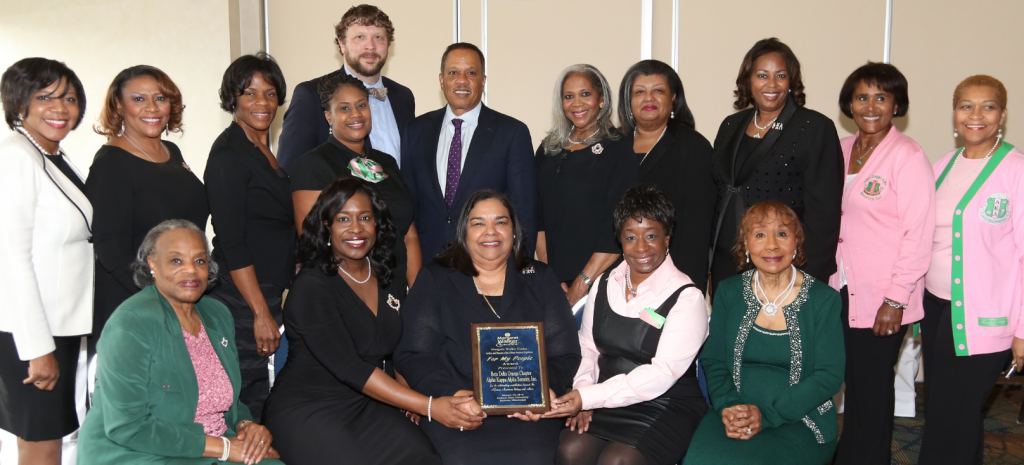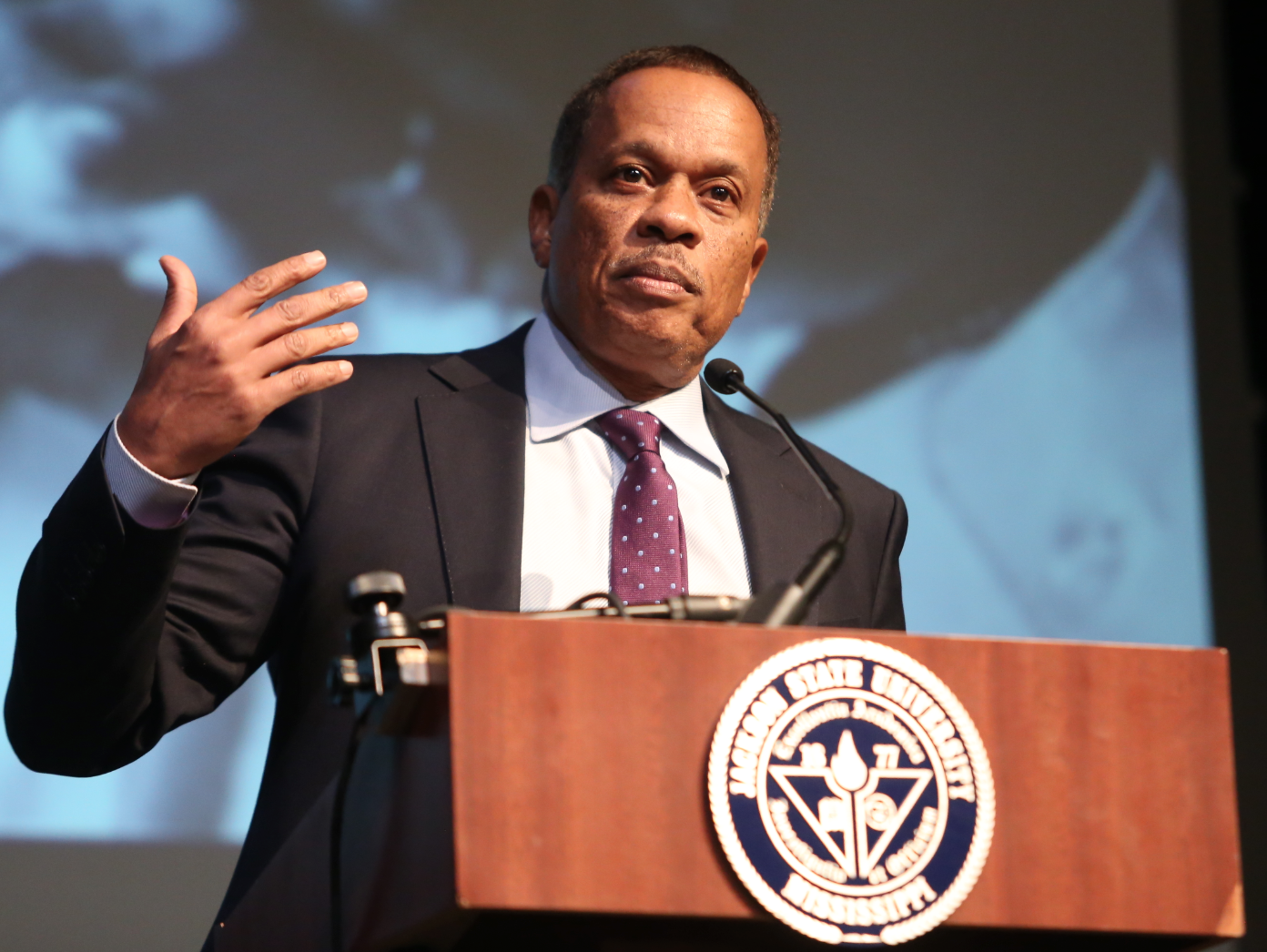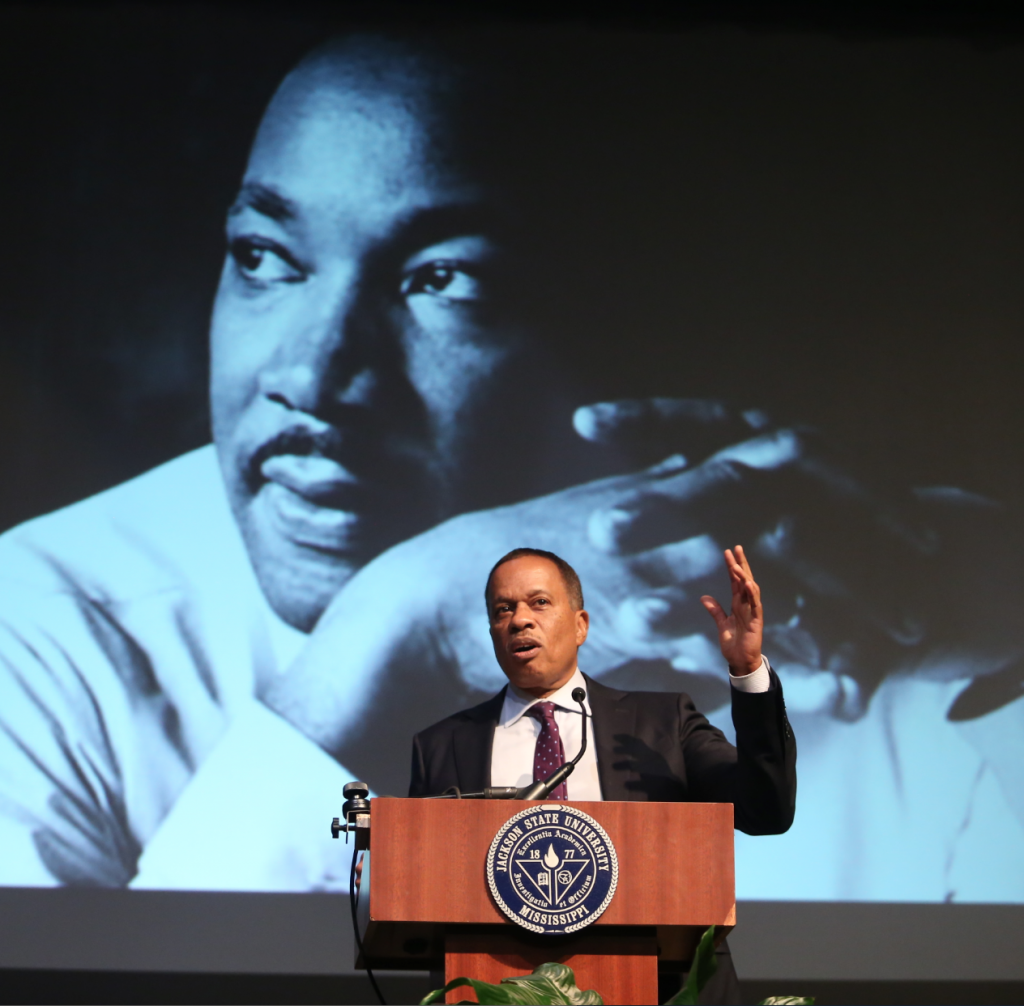
With his eyes still on the prize and using reflections from his best-selling book of the same name, national journalist and author Juan Williams spoke rivetingly at the 48th Annual Martin Luther King Jr. Birthday Convocation at Jackson State University about historical events and people who shaped the country’s civil rights movement.
“I walk in faith, and I believe Dr. King is alive. I feel (him) everyday in my life,” said the Emmy Award-winning political analyst for Fox News and contributor to numerous publications, including the New York Times.
Martyred civil rights legend
Friday’s event was sponsored by JSU’s Margaret Walker Center and was a prelude to Monday’s national holiday celebrating the legacy of the martyred civil rights legend.
Williams – who has interviewed Presidents Barack Obama, George H.W. Bush, George W. Bush, Bill Clinton and Ronald Reagan – said his acclaimed Eyes on the Prize: America’s Civil Rights Years, 1954-1965 continues to surprise him today because “people always come back to the book.” He said, “It’s opened my mind to the idea of a talking book that’s constantly in conversation – not just in my head – but conversation with the readers, conversation with current events and conversation in terms of ongoing racial controversies in our country.”

Dr. Robert Luckett, director of the Margaret Walker Center, said, “As a civil rights historian here at Jackson State, the book keeps talking to me, too. My work and own scholarship owes much to and stands on the shoulders of Eyes on the Prize. I will be using it this very semester as a touchstone for my students in my civil rights class. It will open channels of conversation for those students, and it will represent a living history.”
Notable journalist Williams said he recently discovered that a copy of his book has found a home in the White House library. In addition, while working as a correspondent for the Washington Post in South Africa – covering Nelson Mandela’s release from prison – his book helped him to get an interview with the future president of that nation because Mandela had read Eyes on the Prize, which was published in 1987.
“So, this book is alive for me as the author,” Williams said. “It’s alive in terms of today’s conversations about race in America – new developments and controversies, election of the first African-American president, tragedies, shootings of Tamir Rice, Michael Brown, even disputes about history. Remember the time (the film) “Selma” came out and the controversies about how President (Lyndon B.) Johnson was depicted. In every case, people come back to the book – the history, the starting point for understanding the thinking and finding common ground about race in America today. Sometimes it gets personal and uncomfortable.”
Malcolm X and MLK
Williams said some young people even complain that his book either focused too much on Malcolm X or too excessively on King. In general, he said, the underlining implication for some people was that King was an “acceptable representative of black America and to white America – that he was more milquetoast because he was about nonviolence.” Others, he said, favored the more militant voice and the failure to expose the aggression against Dr. King by then-FBI director J. Edgar Hoover as well as scandals and alleged infidelity by King.
The journalist told students that “this book is opening channels for you to have conversations to see what’s real and understand what you bring to the story, what you bring to the book and your preconceptions.”
Williams dismisses the notion that the civil rights movement is over and that we are post-racial. “I don’t think so. … We have people talking about ‘I can’t breathe.’ ” He said the conversation moves from black lives matter to all lives matter.
By living history, Williams said we learn that King is helping to “shape, influence and inspire us as we deal with the ongoing history of race in America.”
Historical truths
Williams extolled the crowd to never forget where they came from. He said Eyes on the Prize stays alive for him because it triggers many of the following questions: “Could it be that anybody voted against the Civil Rights Act of 1964? Is it true that Nat King Cole, while singing on a stage in Birmingham – and people becoming upset that he’s singing to white women – grabbed him off the stage and beat him? Is it true that Jackie Robinson got booed and that people on his own team turned their backs on him? People say that most people who took part in Freedom Summer were white. I say, ‘Yeah, that’s all true’. In fact, a third of the students involved in Freedom Summer were women,” Williams said.
Another way that the book talks to him, Williams said, is that Eyes is not just about King but also about others such as civil rights figures Medgar Evers in Jackson, Fannie Lou Hamer, Vernon Jordan and Thurgood Marshall. The story about injustice continues, he said, despite having a black man in the White House and a black woman as attorney general. Adding to the conversation is the growth of the Hispanic population and the soaring number of Asian immigrants into this country, Williams said.
Finally, he told young people in the audience that with all the changes happening in this country, people will look to them – as privileged Jackson State graduates – for leadership and guidance the same way they looked to King for direction to deal with chaos and community.
“You are living this history … Dr. King is alive with you … Hold on. Thank God for this moment in history. Shape history to be what you want it be. Stand up; stand strong and know that God is with you. Keep on marching on,” Williams urged.
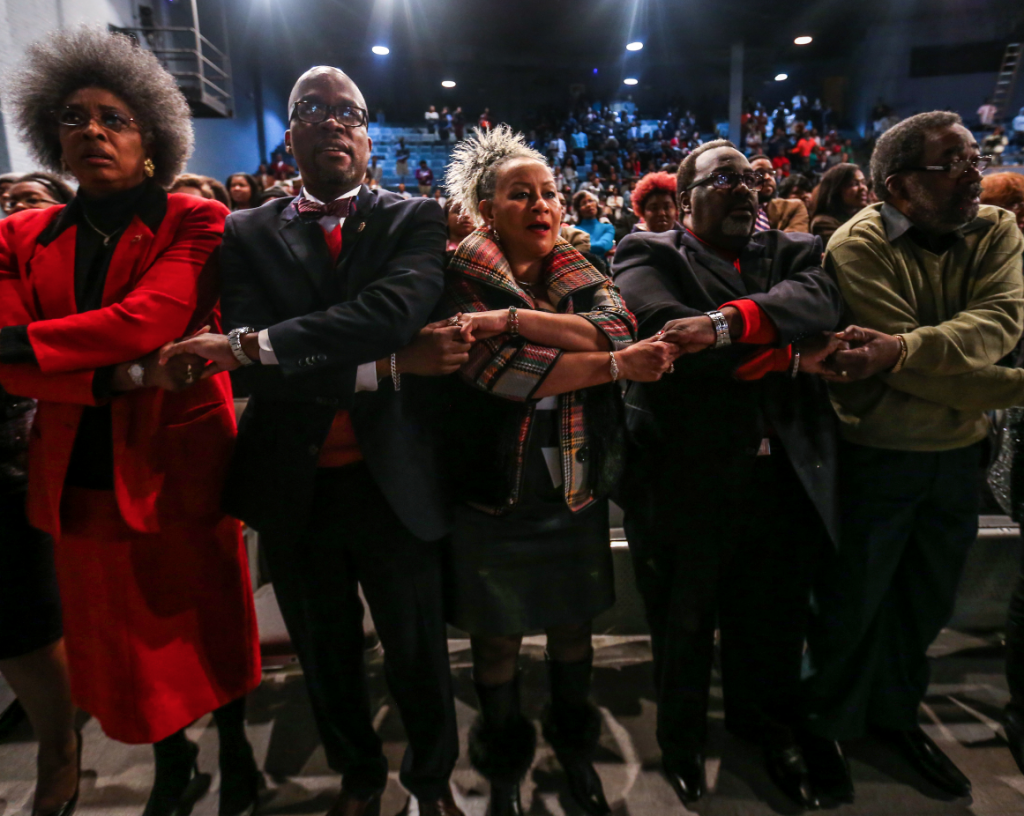
———————————————————————————-
NOTABLE COMMENTS
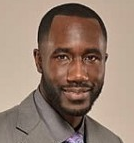
[dropcap]J[/dropcap][dropcap][/dropcap]ACKSON Mayor Tony Yarber: “We don’t celebrate simply what Dr. King did but how he did it. … I am humbled to have the example of one who fulfilled Galatians 5:22, which is the fruit of the spirit, and one who gives me the example that says that (change) can be done – and not only can it be done but done well.”
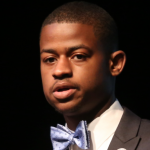
[dropcap]J[/dropcap]SU Student Government Association President Rashad Moore: “The (Rev. Dr. Martin Luther King Jr.) was a man of innovation, service and perseverance. … A piece of King is in each and every one of us. It’s up to us to tap into our fullest potential, and the key to all of this is love.”

[dropcap]M[/dropcap]ISS JSU Charence Higgins: “Martin Luther King had a seismic impact on race relations in the United States. … The Rev. Dr. Martin King’s dreams may have been deferred but not denied. … America is greater now because of the righteous actions of a creative minority that was determined to keep striving toward freedom, toward the promised land. … The time for dreaming has passed. It is now time to force King’s dreams into reality.”
———————————————————————————-
FOR MY PEOPLE AWARDS
Jackson State University’s Margaret Walker Center bestowed its 21st Annual “For My People Awards” to the following recipients for their commitment to the public preservation of African-American history and culture:
- Journalist Juan Williams, for his inspired chronicle of the civil rights movement in his acclaimed book Eyes on the Prize and as a political pundit at NPR, Fox News and contributions to publications such as the New York Times and Washington Post.
- The Emmett Till Interpretive Center in Sumner, Miss., for fostering racial harmony and reconciliation and seeking federal, state and private funds and grants to help restore the Tallahatchie County Courthouse to the near-exact state it was during Till’s 1955 trial. The completed project would serve as an interpretive site for the historical significance of the murder of Till and subsequent miscarriage of justice.
- Alpha Kappa Alpha Sorority Inc. (Beta Delta Omega Chapter founded at Tougaloo College in May 1934), for addressing poverty, health, economic security, voter education, registration and mobilization; and for sponsoring a political forum at the Jackson Medical Mall. (Margaret Walker Alexander was a member of the nation’s oldest African-American sorority.)
- Ida B. Wells-Barnett Museum in Holly Springs, Miss., for promoting education, superior journalism, social justice, equality and integrity for African-Americans.
